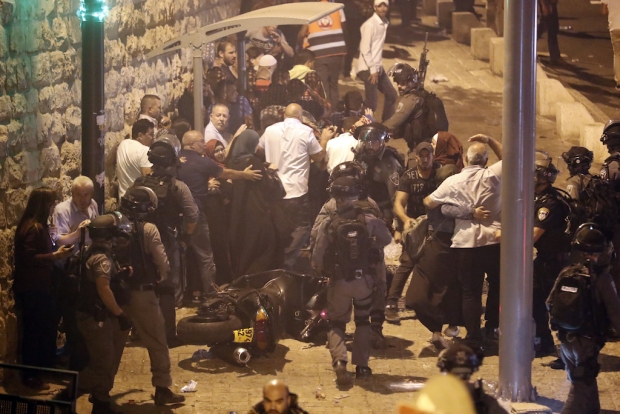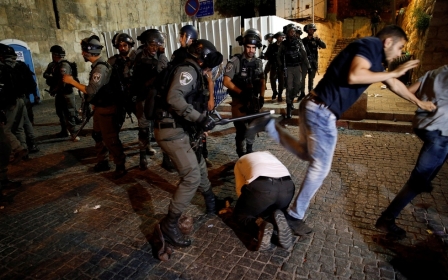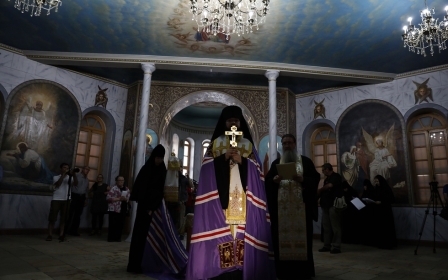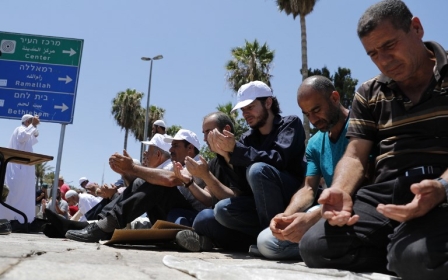'Day of rage': Netanyahu under pressure over holy site after deaths
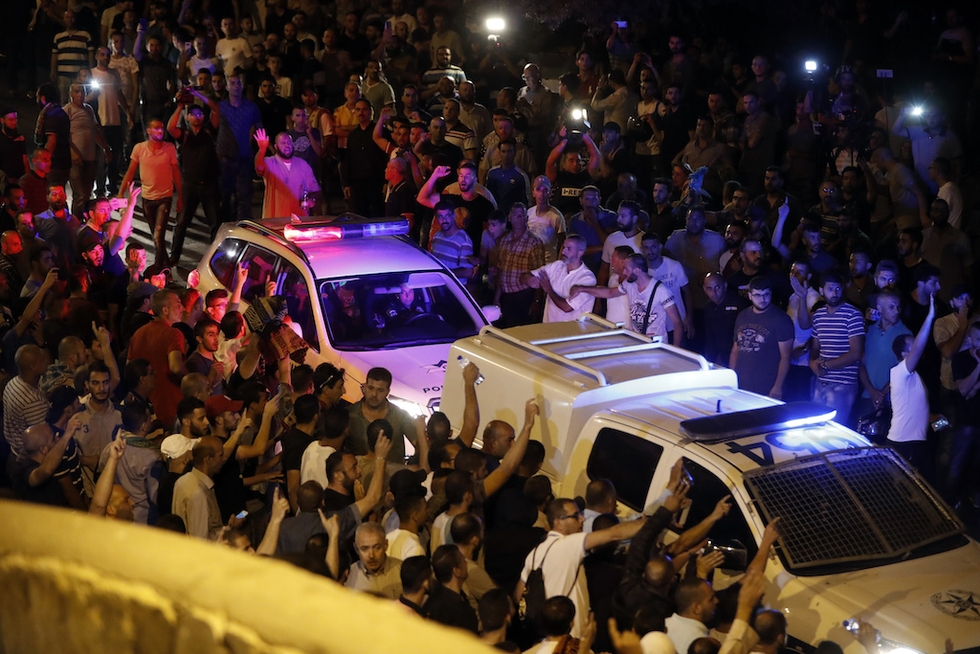
Israeli Prime Minister Benjamin Netanyahu faced mounting pressure Sunday over new security measures at a sensitive Jerusalem holy site after a weekend of violence left eight people dead, as religious leaders called on the international community to support the status quo in Jerusalem.
Israeli officials signalled they may be open to changing the measures at the Haram al-Sharif mosque compound, known to Jews as the Temple Mount, after the installation of metal detectors at entrances following an attack that killed two policemen stoked Palestinian anger.
A group of religious figures, including the Grand Mufti of Jerusalem, called on the international community to apply "political and legal pressure to stop the violation of our holy places, against our people people and mainly against the Al-Aqsa mosque".
"We confirm our complete refusal for metal doors and all the occupation procedures that could lead to to the change in historical and religious status quo of Jerusalem and its holy places especially the Aqsa mosque," they said in a statement.
The metal detectors remained in place on Sunday morning, though cameras had also been mounted near at least one entrance to the compound in Jerusalem's Old City - a possible indication of an alternative to the detectors.
Netanyahu was also holding a cabinet meeting and was due to meet with his security cabinet later in the day.
"Since the start of the events, I have held a series of assessments with security elements including those in the field," he said at the start of the meeting.
"We are receiving from them an up-to-date picture of the situation, as well as recommendations for action, and we will decide accordingly."
Israeli Major General Yoav Mordechai - head of COGAT, the defence ministry agency responsible for civilian affairs in the Palestinian territories - signalled changes to the policy were possible.
"We are examining other options and alternatives that will ensure security," Mordechai said in an interview with Al Jazeera.
Public Security Minister Gilad Erdan said he would continue to support the metal detectors remaining in place unless police provide a satisfactory alternative.
On Sunday, an Israeli court released Hatem Abdel-Kader, the Palestinian Authority's chief negotiator, from prison and set conditions that he must not speak to media or on social media until 27 August. It was also stipulated he should stay away from Al-Aqsa until 2 August.
Speaking to Middle East Eye on Friday, Abdel-Kader warned that if the situation in Jerusalem was not resolved "clashes will inevitably continue, until freedom of religion is restored". He was arrested shortly after.
The crisis has resonated internationally.
The UN Security Council will hold closed-door talks Monday about the spiralling violence after Egypt, France and Sweden sought a meeting to "urgently discuss how calls for de-escalation in Jerusalem can be supported".
Arab League chief Ahmed Abul Gheit on Sunday accused Israel of "playing with fire" with the new security measures.
Tensions have risen throughout the past week over the metal detectors at the compound, which includes the revered Al-Aqsa mosque and the Dome of the Rock, following the 14 July attack that killed two policemen.
Palestinians reject the metal detectors because they view the move as Israel asserting further control over the site. They have refused to enter the compound in protest and have prayed in the streets outside.
Israeli authorities say the 14 July attackers smuggled guns into the holy site and emerged from it to shoot the policemen.
Friday's main weekly Muslim prayers, which typically draw thousands to Al-Aqsa, brought the situation to a boil.
In anticipation of protests, Israel barred men under 50 from entering the Old City for prayers.
Clashes broke out between Israeli security forces and Palestinians around the Old City, in other parts of annexed East Jerusalem and in the occupied West Bank, leaving three Palestinians dead.
On Friday evening, a Palestinian broke into a home in a Jewish settlement in the West Bank during a Sabbath dinner and stabbed four Israelis, killing three of them.
The Israeli army said the 19-year-old Palestinian had spoken in a Facebook post of the Jerusalem holy site and of dying as a martyr.
There were further clashes on Saturday, when Palestinian youths hurled stones and petrol bombs as the army used a bulldozer to close off the attacker's West Bank village and prepare his house for demolition.
Netanyahu said on Sunday the demolition would go ahead "as soon as possible".
Israel frequently razes or seals attackers' homes as a deterrent, although rights groups say this amounts to collective punishment.
Clashes also flared in East Jerusalem and other Palestinian villages in the West Bank near Jerusalem on Saturday, police said.
Two Palestinians died during the clashes, including one when a petrol bomb exploded prematurely.
Hamas arrests
Israeli security forces said Sunday they had arrested 25 men active in the group Hamas that rules the Gaza Strip.
The arrests throughout the West Bank included "senior members," a statement from the Shin Bet internal security agency said, and was part of preventive measures in the wake of "the tensions around the Temple Mount".
Also on Sunday, a rocket fired at Israel from Gaza hit an open area, the Israeli army said, causing no injuries. No Palestinian group claimed responsibility for the rocket.
The holy site in Jerusalem has served as a rallying cry for Palestinians.
In 2000, the visit to the compound by the then Israeli opposition leader Ariel Sharon helped ignite the Second Palestinian Intifada, or uprising, which lasted more than four years.
The Haram al-Sharif/Temple Mount is central to the Israeli-Palestinian conflict.
It is in East Jerusalem, seized by Israel in the 1967 Six-Day War and later annexed in a move never recognised by the international community.
It is considered the third holiest site in Islam and the most sacred for Jews.
Middle East Eye propose une couverture et une analyse indépendantes et incomparables du Moyen-Orient, de l’Afrique du Nord et d’autres régions du monde. Pour en savoir plus sur la reprise de ce contenu et les frais qui s’appliquent, veuillez remplir ce formulaire [en anglais]. Pour en savoir plus sur MEE, cliquez ici [en anglais].


